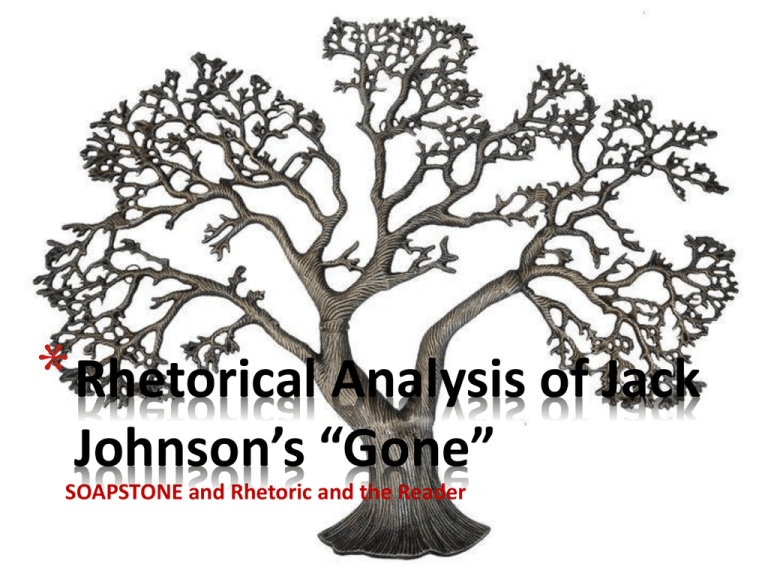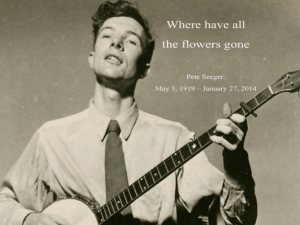Rhetorical Analysis of Jack Johnson`s “Gone”
advertisement

* Rhetorical Analysis of Jack Johnson’s “Gone” SOAPSTONE and Rhetoric and the Reader “Gone” ~Jack Johnson Look at all those fancy clothes, But these could keep us warm just like those. And what about your soul? Is it cold? Is it straight from the mold, and ready to be sold? And cars and phones and diamond rings, Bling, bling, because those are only removable things. And what about your mind? Does it shine? Are there things that concern you, more than your time? Gone, going. Gone, everything. Gone, give a damn. Gone, be the birds, when they don't wanna sing. Gone, people, all awkward with their things, Gone. Look at you, out to make a deal. You try to be appealing, but you lose your appeal. And what about those shoes you're in today? They'll do no good, on the bridges you burnt along the way. And you're willing to sell, anything? Gone, with your head. Leave your footprints, And we'll shame them with our words. Gone, people, all careless and consumed, gone Gone, going, Gone, everything. Gone, give a damn. Gone, be the birds, if they don't wanna sing. Gone, people, all awkward with their things, Gone. “Gone, going. Gone, everything.” The subject of the song is the negative impact of materialism and excess on today’s society. “People, all careless and consumed, gone” *SUBJECT The context of the song is found in our society’s need to focus on materialistic wants instead of our realistic needs. Many people try to fit the Hollywood culture instead of finding their true selves. Many people in today’s society are egotistical; they focus only on themselves. Instead of focusing their efforts on something that is actually important, they spend too much time on themselves “Look at all those fancy clothes, But these could keep us warm just like those. / And what about your soul? Is it cold? / Is it straight from the mold, and ready to be sold?” “And what about your mind? Does it shine? Are there things that concern you, more than your time?” *OCCASION / CONTEXT “Gone, people, all awkward with their things, Gone” The primary audience is young adults. They are at the most impressionable age and often try hard to be accepted by society. “And what about those shoes you're in today? They'll do no good, on the bridges you burnt along the way” *AUDIENCE “And what about your soul? Is it cold?” The purpose of the song is to persuade teenagers and young adults into focusing on the simple things in life and to think twice before indulging in materialistic vanities. Material objects will not last forever; what is more important is what is found within people. “Gone, going, Gone, everything. Gone, give a damn. Gone, be the birds, if they don't wanna sing. Gone, people, all awkward with their things, Gone” *PURPOSE “Look at all those fancy clothes, But these could keep us warm just like those.” The speaker establishes his credibility by providing everyday examples when people give into their impulse to focus on materialism and vanity. He states that people lose themselves by focusing only on their outward appearances. “Gone, going, Gone, everything. Gone, give a damn. Gone, be the birds, if they don't wanna sing. Gone, people, all awkward with their things, Gone.” *SPEAKER “And what about your soul? Is it cold?” The tone of this song is objective, yet cold. The diction the speaker uses suggests a rather unapologetic attitude in order to prove that people lose their true selves through their attempt to conform to societal norms. “Look at you, out to make a deal. You try to be appealing, but you lose your appeal” *TONE The speaker utilizes an external rhyme pattern to draw the readers’ attention to his words and force them to resonate within the readers. The repetition of the word “gone” emphasizes the emptiness that people who indulge in materialism and conform to societal norms will feel; it helps to emphasize the purpose of the song. “Gone, going. Gone, everything. Gone, give a damn. Gone, be the birds, when they don't wanna sing. Gone, people, all awkward with their things, Gone.” Rhythm Pattern: ABAB * “Look at all those fancy clothes, But these could keep us warm just like those. And what about your soul? Is it cold? Is it straight from the mold, and ready to be sold?” *ORGANIZATION “Look at all those fancy clothes… And what about your soul? “ The writer speaks directly to his audience by utilizing the second person point-of view. He literally asks his audience to visualize and reflect upon some of the choices they have made, and then he asks rhetorical questions for each reflection. The rhetorical questions help to prove his point that materialism leaves people feeling empty inside. “And cars and phones and diamond rings… And what about your mind? Does it shine?” “Look at you, out to make a deal…And what about those shoes you're in today?” NARRATIVE STYLE “Look at all those fancy clothes, But these could keep us warm just like those.” The speaker establishes both his ethos and logos by providing evidence from most people’s everyday experiences. Many people spend a lot of money on their appearance in order to feel accepted by our society’s expectations. This makes his argument more believable and gives him more credibility for his argument “And what about those shoes you're in today? They'll do no good, on the bridges you burnt” *EVIDENCE “Gone Lyrics.” Sing365. Web. 25 Sept 2011. http://www.sing365.com/music/lyric.nsf/gone-lyrics-jackjohnson/696ad8c1c3beee6048256d1e000fb3d7. *Works Cited







